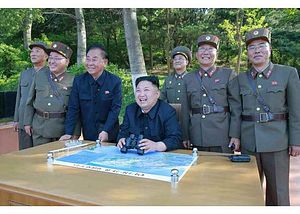The 2019 G20 Summit, an annual meeting between governments and financial officials from the 20 largest world economies, is slotted to take place in Osaka in a few days. Ahead of this significant gathering, much attention has been on North Korea and how it may posture itself as a key topic of discussion between select countries.
North Korea has used shows of military force to regain global attention ahead of previous G20 summits, firing missiles just days ahead of the 2016 and 2017 G20 summits, held in Beijing and Hamburg, respectively. It did not conduct any missile launches ahead of the 2018 summit in Buenos Aires last November, due to its self-declared moratorium on long-range missiles promised ahead of the Singapore Summit between North Korean Leader Kim Jong Un and U.S. President Donald Trump in June 2018.
North Korea conducted a pair of test launches of rockets in May of this year, which could potentially be interpreted as a violation of its self-established missile launch moratorium. However, neither North Korea, South Korea, nor the United States have explicitly acknowledged these weapons as missiles. North Korea called the activity a “tactical guided weapon” test while the South Korean media insisted that the weapons were “projectiles”, not missiles. Trump also downplayed the significance of the launches. By playing with semantics, these major parties vested in the Korean Peninsula peace process that began last year contend that the launches do not undermine the progress made thus far through diplomatic efforts and therefore leave the door open for future negotiations. Furthermore, the tested weapons systems were analyzed and concluded to be similar to the short-range Russian Iskander ballistic missile. These sorts of missiles do not violate the self-imposed North Korean moratorium, which only applies to intercontinental ballistic missiles (specifically, intercontinental-range ballistic missiles).
However, perceived leniency from South Korea and the U.S. may give Kim Jong Un more confidence that he can get away with provocative and escalatory behavior, which may lead to further military exercises if Kim’s meetings with key world leaders occurring ahead of the G20 Summit do not go as planned. Unfortunately, it is this response and the record of U.S.-North Korean relations over the past year– a pattern of rewarding North Korea with negotiations in response to military escalation—which may lead observers to be concerned of another missile launch ahead of this year’s summit, as it had in years past.
Kim has seemed quite earnest for another meeting with Trump since the failed Hanoi Summit that did not result in an agreement between Trump and Kim. Despite warning Trump in early April that he must make a “bold decision” before the end of this year, Kim has not yet successfully established another summit meeting with the U.S. president. In the absence of a reliable U.S.-North Korean relationship, Kim’s urgency for economic relief and need to solidify a great power ally pushed Kim to invite Chinese President Xi Jinping to Pyongyang last week. Xi’s visit was the first visit to North Korea by a Chinese president in 14 years and its significance was marked by an extravagant ceremony welcoming Xi to the North Korean capital. In addition to the nice photos, Kim secured an assurance that China would help establish “peace and stability” on the Korean Peninsula.
Not to be outdone, Trump sent Kim another letter. The North Korean leader announced that he had received an “excellent” letter from the U.S. President and praised Trump for his “extraordinary courage” in continuing to pursue a favorable outcome on the Korean Peninsula. These letters solidify some of the other friendly exchanges that the two leaders have been sharing over the last few weeks.
With a few days until the 2019 G20 convenes, are we likely to see any show of military force from North Korea? Probably not. Historically, North Korea has acted out most during times of antagonism or after diplomatic failures. Since Kim can be fairly certain that he has both Xi and Trump’s ears for now, and confidence that both the U.S. and China find value in the North Korean situation—either as leverage for negotiations or as a distraction from the current trade war between the two countries, it would not be advantageous for North Korea to escalate the situation or pursue an approach other than a diplomatic route at this time.
While security issues are not one of the official themes of the upcoming Osaka meeting, the Korean Peninsula and nuclear issues are likely to come up in the discussions on global economy, environment and energy, and development. We will see in the coming months whether Kim’s amicable attitude with the U.S. and China will lead to a more favorable arrangement for peace and security on the Korean Peninsula, but as long as Kim sees the possibility for a way forward with economic relief and security assurances, we probably won’t see missile launches anytime soon.
Grace Liu is a research associate in the East Asia Nonproliferation Program at the James Martin Center for Nonproliferation Studies.
































